Abstract
Hybrid AC/DC microgrids (HADCMGs), which integrate renewable energy sources and battery storage systems, often face significant stability challenges due to their inherently low inertia and highly variable power inputs. To address these issues, this paper proposes a novel, robust composite controller based on backstepping fast terminal sliding mode control (BFTSMC). This controller is further enhanced with a virtual capacitor to emulate synthetic inertia and with a fractional power-based reaching law, which ensures smooth and finite-time convergence. Moreover, the proposed control strategy ensures the effective coordination of power sharing between AC and DC sub-grids through bidirectional converters, thereby maintaining system stability during rapid fluctuations in load or generation. To achieve optimal control performance under diverse and dynamic operating conditions, the controller gains are adaptively tuned using the marine predators algorithm (MPA), a nature-inspired metaheuristic optimization technique. Furthermore, the stability of the closed-loop system is rigorously established through control Lyapunov function analysis. Extensive simulation results conducted in the MATLAB/Simulink environment demonstrate that the proposed controller significantly outperforms conventional methods by eliminating steady-state error, reducing the settling time by up to 93.9%, and minimizing overshoot and undershoot. In addition, real-time performance is validated via processor-in-the-loop (PIL) testing, thereby confirming the controller’s practical feasibility and effectiveness in enhancing the resilience and efficiency of HADCMG operations.
1. Introduction
1.1. Background and Challenges
The ongoing transformation of the energy sector, driven by global decarbonization targets and long-term sustainability objectives, has accelerated the development and deployment of microgrid technologies and the integration of green renewable energy sources (GRESs) [1,2,3]. In this context, hybrid AC/DC microgrids (HADCMGs) have emerged as a promising configuration that combines the operational benefits of both AC and DC infrastructures. This architecture enables enhanced power delivery efficiency, reduced conversion losses, and increased flexibility in accommodating diverse energy sources and loads [4,5]. The integration of distributed energy resources, particularly photovoltaic (PV) systems and battery energy storage systems (BESSs), further enhances the local generation capacity and supports the resilience of HADCMGs [6]. These resources reduce reliance on centralized fossil-fuel-based generation and contribute to improved grid autonomy. However, the inherent intermittency of GRESs, together with unpredictable load variations, introduces significant challenges in maintaining voltage stability and ensuring real-time power balance [7,8,9]. Unlike conventional power systems, which are dominated by synchronous generators that inherently provide rotational inertia, HADCMGs lack a natural inertial response, thereby increasing their sensitivity to disturbances and fast transients [10].
To address the resulting stability concerns, bidirectional voltage source converters (BVSCs) are employed to manage the power flow between AC and DC subsystems. Though BVSCs offer operational flexibility, their dynamic performance may be compromised under rapid fluctuations in generation and demand [11,12]. Moreover, although BESSs can mitigate power mismatches and support short-term balancing, their integration introduces additional issues, including degradation, efficiency losses, and control complexity [13]. These challenges underscore the need for advanced control strategies that can enhance the dynamic performance and stability of HADCMGs under high GRES penetration. One promising approach involves the use of virtual capacitors to emulate inertial behavior, thereby improving system damping and transient response [1,14]. When combined with robust nonlinear control schemes, such as fast terminal sliding mode control and nonlinear backstepping, virtual inertia mechanisms can provide accurate and adaptive regulation of voltage and power, even under highly dynamic operating conditions. Thus, the coordinated integration of virtual capacitors and nonlinear controllers can significantly enhance system robustness, reduce susceptibility to instability, and support reliable operation in decentralized power networks.
This paper presents a control strategy that leverages virtual capacitors in conjunction with nonlinear control methods to ensure the stable, resilient, and efficient operation of HADCMGs, particularly under high GRES penetration and stochastic load variations.
1.2. Review of State-of-the-Art Techniques
Voltage stability and optimal power distribution in HADCMGs have been extensively addressed through various linear control methodologies. Among these, proportional–integral (PI) controllers remain the most widely adopted due to their simplicity and ease of implementation [15,16]. Pole placement controllers (PPCs) [17], control techniques [18], and linear quadratic regulators (LQRs) [19,20] have also been employed to regulate voltage and manage power flow in microgrids. Notably, PI controllers, as applied in [21,22], have demonstrated satisfactory performance under steady-state and mild transient conditions. However, their effectiveness degrades during abrupt load variations and generation fluctuations due to the lack of adaptability and dynamic response. To address these limitations, droop-based controllers were used in [23,24], offering improved scalability and decentralized power sharing. Despite these advantages, droop controllers remain fundamentally constrained by their linear nature, which limits their ability to manage large-signal disturbances and nonlinear system dynamics. These shortcomings have motivated the exploration of data-driven control strategies that offer better adaptability and robustness under uncertain and variable operating conditions.
In response, intelligent control paradigms, such as neural network (NN)-based and fuzzy logic controllers (FLCs) have garnered significant attention [25,26,27,28,29]. NN-based controllers, such as those in [25], leverage real-time learning to optimize power distribution within HADCMGs. In [26,27], NNs were employed to manage the state of charge (SoC) of BESSs effectively without requiring precise forecasts of renewable generation or load variations, thus improving system resilience. However, despite their adaptiveness, these approaches suffer from drawbacks, including the need for extensive training datasets and a lack of interpretability, which limits transparency in decision-making processes. In contrast, FLCs excel at managing the uncertainty and nonlinearities inherent in microgrid systems [28]. For instance, the optimized fuzzy cascaded PI controller in [29] improves voltage regulation and dynamic response. Nonetheless, FLCs often require careful tuning and may not generalize well across varying operating conditions, limiting their effectiveness in the highly dynamic context of HADCMGs.
To further enhance system stability, especially during transient events, nonlinear control strategies have been introduced [30,31,32,33,34]. In [35], the authors proposed a distributed model predictive control (MPC) framework for HADCMG systems that coordinate multiple converters to ensure stability, optimize power sharing, and maintain voltage and frequency regulation under varying operating conditions. Their approach leverages the predictive capability of MPC to handle nonlinear dynamics and system uncertainties while enhancing the resilience of microgrids to fluctuating loads and renewable generation. Although MPC effectively mitigates nonlinear effects and enhances the robustness of power converters under fluctuating conditions in HADCMG systems, its practical deployment in real-time applications is hindered by two key challenges: the requirement for accurate and up-to-date dynamic system models and the significant computational burden associated with solving the online optimization problem within tight control intervals. On the other hand, Lyapunov-based backstepping control (BSC) techniques have shown promise for achieving stable DC-bus voltage regulation and accurate power sharing under uncertain operating conditions [36,37,38,39]. However, conventional BSC approaches are sensitive to parameter uncertainties and external disturbances [40,41]. Although adaptive variants, such as the one in [42], aim to overcome this by adjusting to unknown parameters, they require the derivative of virtual control signals at each recursive step, making implementation in higher-order systems complex. Furthermore, the robust BSC strategy proposed in [43] seeks to address inertia-related issues but still relies on synchronous generator support, which contradicts decarbonization objectives and adds to system complexity.
Recognizing the limitations of BSC under uncertainties, sliding mode controllers (SMCs) have emerged as a viable alternative due to their inherent robustness [44,45,46,47,48]. A nonlinear SMC incorporating droop characteristics was proposed in [49], targeting the BVSC-based regulation of voltage and current. However, its scope was limited, as it did not consider the impact of BESSs on system dynamics. To address this gap, Refs. [50,51] presented a holistic SMC framework that stabilizes DC-bus voltage and suffers from pronounced chattering, which is a well-known limitation of conventional SMC. To alleviate this, a double integral SMC (DISMC) was introduced in [52,53] for grid-connected microgrids without energy storage systems. Nevertheless, the conventional reaching law in DISMC reintroduces chattering due to finite convergence time constraints. Subsequently, an integral terminal SMC (ITSMC) was proposed in [54], which significantly improved dynamic response by reducing overshoots and integral errors. Yet, ITSMC remains restricted to first-order dynamics and fails to comprehensively handle parameter uncertainties and external disturbances. In light of this, Lyapunov-based adaptive control methods have been explored for power converters in hybrid renewable energy systems [55]. Though these approaches stabilize the DC-bus voltage and coordinate energy exchange effectively, they often neglect the dynamics of the rectifier stage and can suffer from singularity issues, limiting their applicability in practice [56,57].
To mitigate the drawbacks of individual controllers, composite control strategies have been proposed, integrating the strengths of multiple control methodologies [58,59,60,61]. For instance, Ref. [62] demonstrated that hybridizing SMC with BSC can eliminate destabilizing zero dynamics and ensure global system stability. Likewise, the scheme in [63], which combines adaptive integral BSC with fractional-order SMC, achieves improved voltage regulation and reduced chattering. However, guaranteeing chattering-free control with high accuracy across a wide operating range remains an open challenge. Moreover, many of these hybrid strategies have primarily been validated on DC microgrids, limiting their direct applicability to HADCMGs. To address this, Ref. [64] introduced a backstepping terminal SMC for enhanced voltage control and power distribution in HADCMGs. Nonetheless, it overlooks the influence of external disturbances. This shortcoming is addressed in [65], where a backstepping global ITSMC explicitly accounts for such disturbances, improving robustness. However, the issue of low system inertia is a critical limitation in microgrids, which remains insufficiently resolved.
To address low-inertia challenges, virtual capacitor-based strategies have gained momentum [48]. A droop-based control scheme (DPCS) incorporating virtual capacitors for limiting surge currents was proposed in [66], though its use of fixed parameters limits adaptability. To improve this, Ref. [67] proposed a virtual inertia management scheme (VIMS) that eliminates the need for auxiliary controllers; however, it still relies on static gains. In [68], an FLC-based DPCS was introduced to dynamically tune droop coefficients, thereby optimizing power sharing in DC microgrids. Extending these concepts to AC systems, Ref. [69] proposed an adaptive virtual capacitor-based angular DPCS that accounts for both active and reactive power, enhancing disturbance rejection in low-voltage AC microgrids. While these approaches represent significant progress, they predominantly rely on linear control techniques. Although effective under nominal conditions, linear controllers lack the robustness required for handling severe nonlinear transients. Consequently, integrating advanced nonlinear control strategies with virtual capacitor frameworks represents a promising direction for ensuring the resilient and stable operation of HADCMGs under high GRES penetration.
1.3. Key Limitations
Despite the extensive body of work on voltage stability and power management in HADCMGs, several critical limitations and open research gaps persist:
- Limited adaptability of linear control strategies: Traditional PI, LQR, and droop-based controllers are simple and easy to implement but lack the robustness required to handle large transients, nonlinear dynamics, and system uncertainties in GRES-rich HADCMGs.
- Shortcomings of data-driven controllers: Neural network and fuzzy logic-based methods offer adaptability but suffer from interpretability issues, high computational demands, and the need for large training datasets, making real-time tuning difficult.
- Sensitivity of Lyapunov-based BSC: Though effective for transient regulation, standard BSC methods are sensitive to parametric variations and disturbances. Adaptive versions face practical limitations due to their recursive structure and reliance on virtual control signal derivatives.
- Chattering and order limitations in SMCs: Conventional and integral terminal SMC methods exhibit chattering, limited scalability to high-order systems, and the insufficient handling of parameter uncertainties and external disturbances.
- Limited effectiveness of composite control schemes: Hybrid approaches (e.g., BSC-SMC combinations) aim to merge robustness and adaptability but often fail to eliminate chattering or extend applicability to full HADCMG architectures.
- Unresolved low-inertia issues in HADCMGs: The lack of physical inertia due to high GRES penetration remains inadequately addressed, leading to instability during rapid transients and system disturbances.
- The underdeveloped integration of virtual capacitors with nonlinear control: Existing virtual inertia emulation techniques primarily rely on linear control, limiting their ability to manage severe dynamic conditions. Nonlinear virtual capacitance strategies remain largely unexplored.
Research motivation: These gaps highlight the need for a unified nonlinear control framework that ensures finite-time, chattering-free convergence, robust performance under uncertainties, and adaptive virtual inertia support for enhanced stability in modern HADCMGs.
1.4. Main Technical Contributions
This paper proposes a robust composite control strategy based on backstepping fast terminal sliding mode control (BFTSMC) to address critical limitations in the control of HADCMGs. By integrating a virtual capacitor and a bio-inspired gain optimization mechanism, the controller enhances dynamic stability, emulates synthetic inertia, and provides resilience under disturbances. The stability of the closed-loop system is rigorously established via a control Lyapunov function (CLF) framework. Extensive MATLAB/Simulink 2022a simulations and real-time processor-in-the-loop (PIL) validations demonstrate the superiority of the proposed method over conventional strategies. The key technical contributions of this work are summarized as follows:
- Comprehensive dynamic modeling of HADCMG components: Detailed dynamic models are developed for critical HADCMG subsystems, including the solar PV unit, BESS, and BVSC, enabling accurate analysis under diverse operational conditions.
- Virtual capacitor-based inertia emulation: A virtual capacitor is embedded in the control design to counteract low-inertia effects inherent in power electronic systems. This synthetic inertia mechanism significantly enhances transient stability and damping performance during disturbances.
- BFTSMC-based robust composite control design: A novel controller combining BSC with fast terminal SMC ensures finite-time convergence, robust voltage regulation, and seamless AC/DC power exchange under parametric uncertainties.
- Chattering-free sliding dynamics with a fractional power reaching law: To mitigate the chattering issue typically found in sliding mode control, a fractional power-based reaching law is introduced. This approach guarantees smooth control action while maintaining rapid and finite-time convergence.
- The adaptive gain tuning of BFTSMC via the marine predators algorithm (MPA): A metaheuristic optimization strategy based on the MPA is employed for the online tuning of control parameters. This adaptive mechanism enhances system robustness and responsiveness to fluctuating PV generation and dynamic loads.
- Validation through high-fidelity simulation and real-time experimentation: The effectiveness of the proposed control framework is validated through detailed simulations in MATLAB/Simulink and further verified via PIL testing, demonstrating real-time feasibility and superior dynamic response compared to benchmark controllers.
2. Overview of the HADCMG
This section presents the structural configuration and operational principles of the proposed HADCMG. The HADCMG integrates renewable generation, energy storage, and variable load elements across both AC and DC domains. It is designed to enhance the energy utilization efficiency, enable real-time power sharing, and ensure stable operation under dynamic generation and load conditions.
First, the microgrid architecture is described in terms of its major subsystems, including the solar PV array, BESS, DC–DC converters, and BVSC. The roles and interconnections of the DC and AC sub-grids are detailed, emphasizing how the system supports bidirectional energy flow and voltage regulation. Then, the operational structure of the HADCMG is explained under two primary scenarios: power surplus and power deficit. The energy dispatch logic, priority of load servicing, battery charging/discharging coordination, and AC/DC power exchange strategies are discussed. This provides a foundation for understanding the control challenges addressed in the following sections.
2.1. Configuration of the Microgrid
Figure 1 illustrates the comprehensive architecture of the proposed HADCMG, which is structured into two closely integrated domains: a DC sub-grid and an AC sub-grid. This hybrid framework enables the efficient coordination of distributed energy resources, such as solar PV and battery energy storage systems (BESSs), along with the flexible management of diverse load types. The architecture is further enhanced by intelligent control and optimization strategies to maximize performance and reliability.
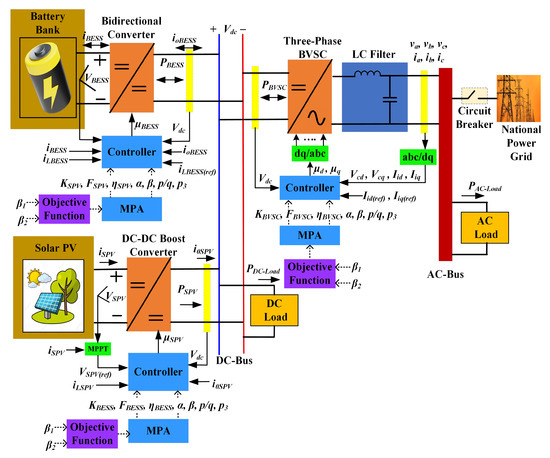
Figure 1.
Architecture of the proposed HADCMG with integrated composite controllers and MPA-based parameter optimization.
The DC sub-grid is the primary domain for integrating renewable energy and BESS. A solar PV system is connected through a DC–DC boost converter (DBC) to a 640 V DC-bus, where maximum power point tracking is employed to ensure optimal energy harvesting. A BESS is connected via a bidirectional DC-DC converter (BDC), allowing for both charging and discharging operations. These operations are managed based on the battery’s state of charge (SoC), contributing to improved energy balance and battery longevity. DC loads are supplied directly from the DC-bus, enhancing efficiency by minimizing conversion stages. The AC sub-grid operates at 220 V RMS and is interfaced with the DC sub-grid through a three-phase bidirectional voltage source converter (BVSC). This converter plays a crucial role in facilitating bidirectional energy flow, maintaining voltage and frequency stability, and managing AC-side power quality. It also interfaces with LC filters to smooth current and voltage waveforms, and connects to the AC bus through a circuit breaker, allowing connection to the national grid and AC loads. The system supports both grid-tied and islanded modes, enabling operational flexibility.
At each power interface (DBC, BDC, and BVSC), dedicated controllers generate modulation signals to regulate system variables (e.g., current, voltage). These controllers are constructed using the BFTSMC frameworks, enhanced with virtual capacitance for inertia emulation and robustness against transients. The control parameters are adaptively tuned using the MPA, which minimizes a single-objective function designed to improve both steady-state voltage tracking and dynamic voltage regulation by penalizing large voltage errors and high rates of voltage change. This coordinated control and optimization architecture ensures that the HADCMG operates efficiently and stably under variable generation and load conditions.
2.2. Operational Structure
The operational logic of the HADCMG is designed to dynamically balance generation, storage, and demand across both subgrids under varying operating conditions. The system operates in two fundamental modes based on the instantaneous power balance: surplus mode and deficit mode.
(1) Surplus mode: In surplus conditions, where power generation is primarily from the solar PV unit and exceeds the total system demand, the energy management system follows a prioritized dispatch strategy within the DC sub-grid:
- Supply DC loads: Real-time DC load demands are met as the priority to ensure the uninterrupted operation of connected devices.
- Charge BESS: Remaining power is directed to charge the BESS, subject to SoC constraints and allowable charging limits.
- Support AC loads via BVSC: Surplus energy beyond DC needs is transferred through the BVSC to meet AC load requirements.
- Export to utility grid: Any additional surplus, after satisfying both DC and AC loads, is exported to the main utility grid (if grid-connected), thereby minimizing renewable curtailment and enhancing system efficiency.
This hierarchical control ensures that renewable energy is utilized optimally while maintaining energy balance and minimizing curtailment.
(2) Deficit mode: In deficit conditions, when load demand exceeds available renewable generation, the system employs a compensation hierarchy:
- Discharge BESS: The BESS discharges stored energy to compensate for the generation shortfall, provided that the SoC remains within its operational bounds.
- Bidirectional power exchange via BVSC: If the deficit persists, the BVSC facilitates energy import from the AC sub-grid or utility grid to the DC domain or vice versa—depending on the location of the shortfall.
- Prioritize critical loads: Load prioritization is enforced, with critical and essential loads receiving precedence. Simultaneously, system controllers ensure voltage and frequency stability during transient recovery.
This bidirectional exchange ensures power continuity and system integrity even under severe generation deficits or load surges. Through the coordinated operation of power converter interfaces, intelligent control logic, and energy storage management, the HADCMG maintains stable voltage profiles, supports critical loads, and enables resilient performance under stochastic generation and variable demand. The modular and scalable nature of the architecture makes it highly adaptable for smart buildings, remote communities, and future urban energy hubs.
3. Dynamical Modeling and Problem Formulation
This section presents the dynamical models of the major components comprising the proposed HADCMG, including the solar PV system, BESS, and BVSC. Each model integrates the effect of a virtual capacitor to emulate synthetic inertia and enhance the system’s transient response. These component-level models are developed in the time domain and form the basis for the subsequent design of a composite nonlinear control strategy.
3.1. Modeling of the Solar PV Unit
The solar PV system is connected to the 640 V DC-bus through a DBC, which operates under MPPT and voltage regulation control. The equivalent electrical model is shown in Figure 2, and the corresponding state–space equations are given by
where and represent the terminal voltage and current of the PV unit, is the inductor current, is the control duty ratio of the DBC, and denote the equivalent circuit parameters. All variables are defined in [1,58,59].
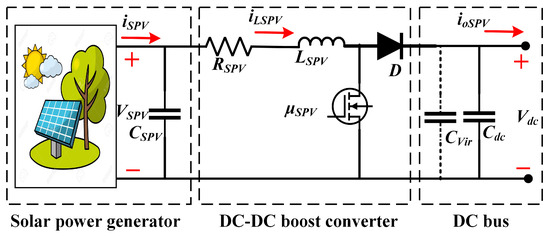
Figure 2.
Photovoltaic generation system coupled with a DBC and virtual capacitance.
3.2. Modeling of the BVSC with Output LC Filter
The BVSC enables power exchange between the AC and DC sub-grids and plays a crucial role in voltage support and dynamic balancing. An output LC filter is included to improve power quality. The equivalent circuit is shown in Figure 3, and the corresponding dynamical model in the synchronous -reference frame is expressed as
Here, , are the converter output voltages, , are the inductor currents, and , are modulation indices. , , and are the filter and DC-bus capacitor parameters. All parameters and symbols are briefly defined in [1,65].
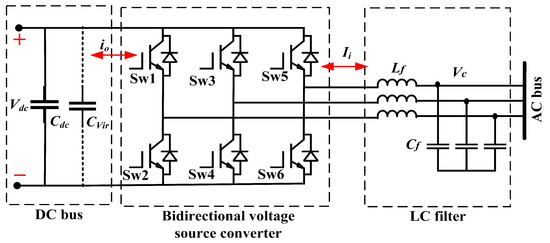
Figure 3.
BVSC integrated with an LC filter and virtual capacitor.
3.3. Modeling of the BESS Unit
The BESS is connected to the DC-bus via a BDC, allowing it to charge/discharge based on system requirements and SoC limits. The equivalent circuit is depicted in Figure 4, and its dynamical behavior is governed by
In these equations, denotes the battery current, is the control input of the BDC, and and are the circuit parameters. All remaining symbols are as defined in prior works [1,58,59,65].
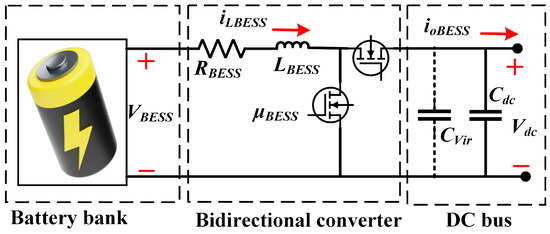
Figure 4.
Equivalent model of the BESS integrated with a BDC and virtual capacitor.
3.4. Problem Formulation
One of the principal challenges in HADCMGs arises from their inherently low inertia, which undermines system stability and deteriorates dynamic response. Unlike conventional AC systems where synchronous generators naturally provide inertia and damping, HADCMGs rely on power electronic converters that lack these mechanical properties. As a result, they become highly sensitive to voltage and power fluctuations, particularly under high PV penetration and variable load profiles. To address these issues, modern HADCMGs incorporate PV and BESS units to support both AC and DC subgrids. However, maintaining a stable DC-bus voltage remains a persistent difficulty due to intermittency in GRESs and fluctuations in load demand. The physical DC-bus capacitor plays a vital role in regulating voltage and balancing power between the subsystems. Yet, increasing its physical capacitance, , leads to trade-offs, such as increased cost, larger volume, and a slower dynamic response.
To overcome these limitations, virtual capacitance is introduced as an effective alternative. By emulating the behavior of a physical capacitor through control algorithms and converter dynamics, virtual capacitance enhances transient response and voltage stability without the drawbacks associated with bulky hardware. This approach is particularly advantageous in HADCMGs, where space, response time, and adaptability are critical considerations. The impact of virtual capacitance becomes especially evident when integrated with existing SMC strategies. As demonstrated in Figure 5, a comparative analysis shows that an SMC integrated with virtual capacitance yields superior performance compared to one without it—especially during transients and load variations. The SMC with virtual capacitance achieves a settling time of 220 ms and an overshoot of 0.78%, compared to 400 ms and 1.09% for the standard SMC. Furthermore, the voltage nadir improves from 631 V to 632 V with the integration of virtual capacitance. These results indicate enhanced voltage regulation and faster dynamic response, establishing virtual capacitance as an indispensable feature for stabilizing low-inertia HADCMGs.
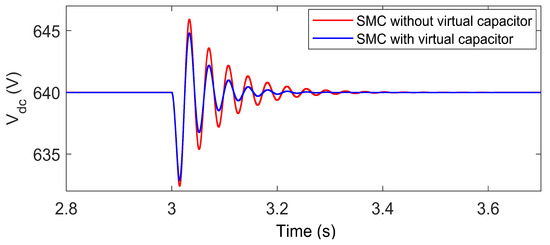
Figure 5.
DC-bus voltage stabilization via a virtual capacitor integrated sliding mode control algorithm.
Beyond nominal performance, the proposed control design emphasizes robustness under external disturbances. In practical settings, HADCMGs are exposed to both internal uncertainties and external disturbances. To validate its resilience, the proposed framework systematically accounts for these perturbations and evaluates performance under a wide range of operating conditions. This ensures that the HADCMG maintains stability, adaptability, and control integrity in real-world deployments.
3.5. Incorporating Virtual Capacitance: Concept and Modeling Framework
A virtual capacitor is introduced using control-based emulation techniques that mimic the energy storage behavior of physical capacitance without adding hardware. The principle behind virtual capacitance lies in the dynamic relation between voltage variation and equivalent stored energy. During transient conditions, the capacitor either absorbs or injects power depending on the voltage derivative. By shaping the control law to inject synthetic current or power proportional to , the controller can mimic the energy buffering effect of an additional capacitance. Mathematically, this synthetic compensation is realized through the following equation:
where is the virtual capacitance, and is the power injected/absorbed by the virtual capacitor during transients. This modification leads to an effective capacitance at the DC-bus, which can be expressed as follows:
The total dynamic response of the DC-bus voltage is now governed by , which incorporates both physical and virtual contributions. This effective capacitance is then substituted into the dynamic equations of each subsystem, such as PV unit, BVSC, and BESS, to reflect the enhanced inertia and damping effects. Additionally, the virtual capacitor acts as a transient energy buffer that smooths voltage fluctuations, reduces overshoot/undershoot, and accelerates system settling under disturbances or load variations.
In the following subsections, the dynamical models of the main components are systematically updated by embedding the concept of virtual capacitance, along with external disturbances, to formulate a realistic and control-ready system representation.
3.5.1. Modeling of the PV Unit Incorporating a Virtual Capacitor
In HADCMG, the PV unit experiences rapid power variability due to the changing solar irradiance, making accurate dynamic modeling essential for real-time voltage regulation. To address this, a virtual capacitor is introduced to enhance transient response and mitigate voltage dips or surges during disturbances (see Figure 2). Now, accounting for both virtual capacitance and external disturbances, the modified PV unit dynamics are as follows:
Here, , , and represent external disturbances affecting capacitor voltage, inductor current, and DC-bus voltage, respectively.
3.5.2. Modeling of the BVSC with an Output LC Filter and a Virtual Capacitor
The BVSC plays a pivotal role in coordinating power exchange between AC and DC subgrids. Its stability is crucial, especially under bidirectional operation. Incorporating a virtual capacitor helps stabilize the shared DC-bus voltage during switching and load fluctuations, as illustrated in Figure 3. Considering both the influence of virtual capacitance and exogenous disturbances, the enhanced dynamic model of the BVSC with an output LC filter and a virtual capacitor becomes
Each , encapsulates the influence of model uncertainties and external perturbations on corresponding system states.
3.5.3. Modeling of the BESS Incorporating a Virtual Capacitor
The BESS provides essential support during load transients, demand–supply imbalance, and renewable variability. Ensuring its reliable dynamic modeling is critical for effective SoC control and voltage stabilization. Virtual capacitance improves the converter’s responsiveness and damping characteristics, especially during fast charging/discharging cycles (see Figure 4). The BESS dynamics, enhanced with virtual capacitance and disturbance terms, are represented as
where and model the disturbances affecting the BESS current and the DC-bus voltage, respectively. These terms reflect uncertainties due to measurement errors, component aging, or external noise.
4. Proposed BFTSMC Design with Fractional Power-Based Reaching Law
This section elaborates on the design framework of the proposed robust controller, referred to as the BFTSMC, which incorporates a fractional power-based reaching law. The controller is tasked with generating dynamic control signals for the individual units of the HADCMG. A comprehensive derivation is provided for the solar PV system interfaced via a DBC and virtual capacitor, which serves as a representative model. For the remaining subsystems, the control strategies follow a similar design structure and are thus outlined succinctly.
4.1. BFTSMC Design for the Solar PV Unit
To facilitate the high-precision control of the solar PV unit, a hierarchical tracking structure is employed involving multiple error definitions and Lyapunov-based convergence guarantees. The control development is presented step-by-step for clarity and rigor. The derivation is structured in a stepwise manner as follows:
Step 1: Definition of the first tracking error
In this step, the tracking error, expressed as a function of the PV panel’s output voltage , is defined as follows:
where is known as the reference output voltage of the PV system, which is generated through the MPPT. Differentiating Equation (9) and incorporating Equation (6), the derivative of is given by
A virtually regulated signal (VRS) is used to regulate such that , ensuring tends to zero. To gain the above criteria, the Lyapunov theory is expressed as
Differentiating and incorporating Equation (10) yields
To ensure , or must hold. This is achieved by selecting the VRS as
where denotes the upper limit of , stands for a user-defined parameter, and it is considered that . Substituting Equation (13) into Equation (12) yields
For , it follows that .
Step 2: Definition of the second tracking error
The second tracking error is defined as follows:
Differentiating and incorporating Equation (3), yields
In this step, the Lyapunov function is updated as follows:
Differentiating and incorporating Equations (16) yields
To ensure or , the stabilizing function is chosen as follows:
where represents the upper limit of , and is a user-defined constant ensuring . Now, substituting Equation (19) into Equation (18), will yield
From Equation (20), when and .
Step 3: Definition of the third tracking error
As is a VRS to guarantee the DC bus voltage stability, the third tracking error for is defined as
The derivative of utilizing the Equation (3) is expressed as
Now, the second derivative of is given by
Step 4: Selection of an appropriate sliding surface
In this step, to ensure finite-time convergence, mitigate singularity issues, and improve robustness, a fast terminal sliding surface is designed. The sliding surface is defined as:
where , are designed parameters, and is the fractional power for finite-time convergence. The derivative of , employing , is presented as
The value of in Equation (23) is replaced by Equation (25) as follows:
Step 5: Design of an enhanced reaching law
To improve the transient performance and reduce undesirable chattering, this study proposes an enhanced reaching law based on a fractional power formulation. The proposed reaching law is defined as:
where ensures finite-time convergence with a smooth approach to the sliding surface, and are positive design parameters regulating the convergence rate and steady-state behavior.
Conventional reaching laws, which primarily rely on the discontinuous function, are known to induce high-frequency oscillations in the control signal, commonly referred to as chattering. In contrast, the proposed reaching law integrates both discontinuous and continuous dynamics to achieve a more balanced control action. Its structure offers the following advantages:
- The term guarantees robustness against matched disturbances and model uncertainties by ensuring that the system state is consistently directed toward the sliding surface.
- The term becomes dominant in the vicinity of the sliding surface, where is a small number. This feature attenuates control activity and significantly reduces chattering without compromising convergence.
- The use of a fractional exponent introduces a continuous nonlinearity that enables faster and smoother reaching compared to linear or exponential reaching laws, thereby enhancing both transient response and steady-state accuracy.
- The proposed law exhibits a superior performance compared to traditional reaching strategies such as constant rate, exponential, power-rate, and boundary-layer-based methods, particularly in systems with nonlinear and time-varying dynamics.
Overall, the proposed reaching law provides a practical and efficient solution that improves robustness, smoothness, and feasibility of sliding mode control implementations in high-performance power electronic and energy systems.
Step 6: Determination of the control law
Equating Equations (26) and (27) will yield
From Equation (28), the overall control law for the solar PV unit is derived as follows:
Employing Equation (29), Equation (27) is reduced as:
Step 7: Stability analysis for the solar PV system
To evaluate the convergence of all errors, the ultimate Lyapunov function is defined as
Differentiating with respect to time yields
For the system stability, must be negative semi-definite or negative definite, i.e., . Incorporating the switching control input, Equation (32) simplifies to
For Equation (33) to be negative semi-definite, the following conditions must hold:
where , , and are predefined bounds. Hence, the control law in Equation (29) ensures the stability of the solar power generation system.
Step 8: Reachability analysis for the proposed reaching law
To ensure the system’s finite-time convergence under the proposed reaching law, the dynamics of can be analyzed for two cases: and .
Case 1:
Substituting into (27), will yield
Rewriting (34)
Now, the time required for from an initial value is
where ensures finite-time convergence.
Case 2:
Substituting into (27), yields
Rewriting (37)
Now, the time required for from an initial value is
where ensures finite-time convergence. For both and , the proposed reaching law guarantees the finite-time convergence of to zero while mitigating chattering through the smooth term.
The switching control signals and reachability analysis for the remaining units are derived using the same procedure. However, these steps are not reiterated here to avoid redundancy.
4.2. BFTSMC Design for the BVSC
The control input for the BVSC, which incorporates an output LC filter and a virtual capacitor, is derived similarly to Section 4.1. The resulting control laws are as follows:
where , , , , , , , and in which .
4.3. BFTSMC Design for the BDC with the BESS
The switching signal for the BESS unit, along with the BDC and a virtual capacitor, is derived using the same approach as described in Section 4.1, as follows:
where and are error variables, , , , with and as positive control parameters, while and are known bounds to external disturbances, with , .
It is evident from the above that the control law for each HADCMG unit is governed by both system state variables and user-defined parameters. To enhance the dynamic performance and ensure optimal controller behavior, these parameters are systematically tuned using a metaheuristic optimization technique. The subsequent section presents and analyzes the simulation results based on the optimized control laws.
5. Marine Predators Algorithm (MPA)
MPA is a bio-inspired metaheuristic optimization technique that models the intelligent foraging strategies of marine predators in heterogeneous environments [70]. In this work, MPA is employed to adaptively tune the control parameters of the proposed BFTSMC controller, aiming to achieve optimal voltage regulation performance in a dynamic operating environment. The optimization is governed by the following objective function:
where is the instantaneous DC-bus voltage, is its reference value, is the time derivative of the voltage, and are weighting factors that determine the relative importance of voltage tracking accuracy and transient smoothness.
Unlike conventional single-term performance indices that focus solely on minimizing tracking error, the proposed objective function incorporates both static and dynamic components. Specifically, the inclusion of the voltage derivative term serves multiple critical control objectives:
- Enhance transient damping response: By penalizing rapid variations in DC-bus voltage, the controller is guided to respond more gracefully to load and generation disturbances, thereby avoiding abrupt transitions.
- Ensure smoother and more continuous control signals: Limiting the rate of voltage change reduces switching stress on power electronic components and promotes a more stable modulation pattern.
- Suppress high-frequency oscillations and chattering: The second term in Equation (43) inherently discourages aggressive control actions, mitigating voltage ripples and high-frequency artifacts that may otherwise degrade system performance and reliability.
- Support practical implementability: By reducing control-induced voltage spikes and discontinuities, the system becomes more compatible with physical constraints, such as converter bandwidth limits and EMI considerations.
Minimizing the composite cost function in Equation (43) enables the MPA-optimized BFTSMC to achieve a well-balanced trade-off between steady-state voltage accuracy and dynamic performance. This dual-objective formulation results in reduced overshoot, shorter settling times, and improved robustness under a wide range of operating conditions, including fluctuating renewable inputs and load disturbances.
- Population initialization:
Let N be the number of search agents and d the number of optimization variables. The initial positions are generated as
where , and , are variable bounds.
The initial search agents are stored in the prey matrix (PM):
The best agent (i.e., the one minimizing ) is replicated to form the elite matrix (EM):
where is the elite vector and is updated as better solutions emerge.
- Three-phase movement:
MPA divides the optimization into three phases based on iteration count.
Phase 1 (Exploration; ):
Phase 2 (Transition; ):
First half (Lévy-based exploitation):
Second half (Brownian-based exploration):
with .
Phase 3 (Exploitation; ):
- FADs effect and memory saving:
To escape local optima, FAD-based long-range jumps are introduced, which can be presented as follows:
where , is a binary vector and .
- Elite update:
At each iteration, agents are evaluated using . The EM is updated by the following equation:
This mechanism ensures convergence toward the global minimum of the control objective as defined in Equation (43).
6. Performance Evaluation and Discussion
This section demonstrates the efficacy of the proposed MPA-optimized composite control strategy in ensuring system stability, robust DC-bus voltage regulation, and optimal power distribution within the HADCMG. The global system model, developed in MATLAB/Simulink, incorporates coordinated control mechanisms across all interfaced power converters to maintain dynamic stability under diverse operating scenarios. As illustrated in Figure 6, each subsystem is seamlessly integrated through composite controllers that contribute to the overall resilience and optimality of the hybrid energy architecture.
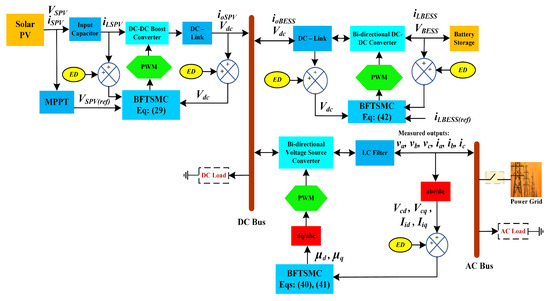
Figure 6.
Control architecture of the proposed methodology.
The solar generation subsystem leverages an MPPT technique to ensure the continuous extraction of peak solar energy as illustrated in Figure 6. The MPPT unit generates a reference voltage , which is compared with the measured panel voltage to yield a voltage error signal . This error, affected by external disturbances, is processed using the proposed BFTSMC-based control law detailed in Equation (29), which dynamically adjusts the duty cycle of the DBC via pulse-width modulation (PWM). This ensures both voltage stability and efficient energy flow towards the DC-bus. The BESS subsystem functions as a flexible energy buffer, responsible for balancing transient mismatches between generation and consumption. Voltage and current measurements and are processed through an error-generation loop subjected to perturbations, with the BFTSMC controller (as defined in Equation (42)) driving corrective control actions. This controller compares against its reference , producing a control signal for modulating the BDC. The associated PWM commands govern battery charging and discharging behavior, stabilizing the DC-bus voltage during both steady-state and contingency conditions.
The BVSC plays a pivotal role in interfacing the DC and AC sides of the microgrid. It uses real-time phase voltage and current signals and , transformed into their counterparts via an transformation. The errors between reference and measured quantities are processed using the BFTSMC structure to yield modulation indices and (Equations (40) and (41)). These are then mapped back to three-phase signals using a transformation, followed by the PWM-based switching of the BVSC. An LC filter further smooths the output to maintain a high-quality voltage supply at the AC–bus interface. All converters (DBC, BDC, and BVSC) operate with a switching frequency of kHz and a sampling frequency of kHz. The MPA-optimized BFTSMC ensures robust performance against disturbances and uncertainties, thus enabling stable, seamless, and intelligent power management across the integrated PV, BESS, DC and AC loads, and utility interface. The system parameters of the HADCMG are briefly given in [1].
6.1. Control Parameters Optimization
Enhanced robustness and optimal dynamic performance of the HADCMG are achieved through the integration of MPA for the real-time tuning of the gain parameters associated with the proposed composite controller. The MPA adaptively modulates key control variables, such as convergence rates, disturbance compensation gains, and sliding surface coefficients—based on instantaneous system behavior, enabling the controller to maintain stability and performance across a wide range of time-varying operating conditions. Distinctively, the proposed control framework incorporates online metaheuristic optimization, whereby MPA operates continuously in real time to refine control gains in accordance with evolving system states and the multi-objective performance index defined in Equation (43). This online adaptation ensures high responsiveness to sudden changes in renewable energy input, load fluctuations, and internal system disturbances, while simultaneously enhancing the system’s resilience and control precision.
The MPA iteratively minimizes the objective function Equation (43), generating an optimal and subsystem-specific set of gain values for the PV, BESS, and BVSC components. This allows coordinated performance tuning across heterogeneous subsystems within the HADCMG. The entire process for obtaining the optimal parameter values is illustrated in Figure 7. To ensure physical implementability and numerical stability, all controller parameters are constrained within explicitly defined upper and lower bounds as presented in Table 1. For improved readability and transparency, these parameter boundaries are presented below in a matrix-style tabulation, facilitating reproducibility and clarity in the optimization process:
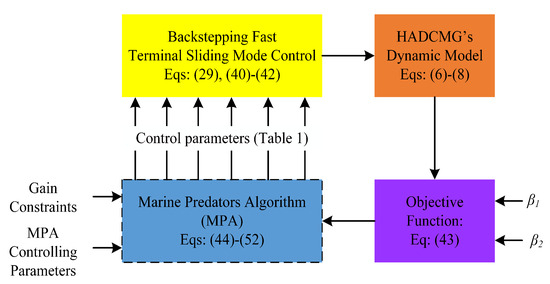
Figure 7.
Implementation block diagram of the proposed MPA-based control parameters optimization.

Table 1.
MPA parameter boundaries for the BFTSMC tuning in HADCMGs.
The HADCMG system is simulated in MATLAB/Simulink, while the control parameter optimization is executed through a standalone MATLAB m-script based on the MPA algorithm, as outlined in Algorithm 1. The optimizer operates with a population size of 50 over a maximum of 100 iterations. The objective function, illustrated in Figure 8, guides the evolutionary search to convergence. Upon completion, the final optimized parameters ensuring robust and responsive control performance are presented in Appendix A for reproducibility and implementation.
| Algorithm 1 Marine predators algorithm (MPA) |
|
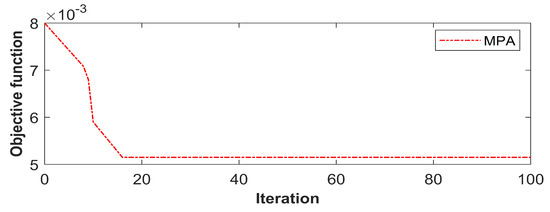
Figure 8.
Convergence of the MPA.
6.2. Simulation Results
To rigorously assess the effectiveness and robustness of the proposed BFTSMC controller, two distinct simulation scenarios are designed, each targeting a specific set of operational challenges representative of real-world HADCMG conditions:
- Scenario I: Renewable and Load Variability: This scenario investigates the dynamic response of the proposed controller under significant fluctuations in renewable energy generation and load demand. A comparative performance analysis is conducted against an ESMC [54] to highlight improvements in tracking accuracy, chattering mitigation, and disturbance rejection.
- Scenario II: Impact of Time-Varying Delay: This scenario examines the control system’s resilience and stability in the presence of communication or actuation delays, in addition to renewable and load variability. The BFTSMC controller is benchmarked against an MPC [35], emphasizing delay-tolerant control performance, transient quality, and voltage regulation fidelity.
These scenarios are strategically selected to evaluate both nominal and delay-affected system conditions, thereby validating the controller’s applicability in practical, high-variability microgrid environments. Quantitative and qualitative metrics, such as voltage deviation, settling time, control effort, and overshoot, are used for comprehensive comparison and analysis.
6.2.1. Scenario I
This scenario analyzes the controllers’ dynamic responses under variable solar PV generation and changing load profiles on both the DC and AC sides of the HADCMG. During the initial steady-state phase, all controllers maintain voltage stability and power balance with minimal deviation, indicating comparable performance under nominal conditions. However, when subjected to abrupt changes, such as sudden drops in solar irradiance or load surges—distinct differences emerge in their dynamic behavior. These transient responses are discussed in detail in the following.
- Steady-state operation with maximum PV generation (t = 0–3 s)
At the outset of the simulation period (t = 0–3s), the PV array operates under standard test conditions, receiving an irradiance of 1000 W/m2. Under these optimal conditions, it generates a peak output of approximately 10.50 kW, as shown in Figure 9. During this steady-state interval, the system encounters a load demand of 2.5 kW on the DC bus (see Figure 10) and 3.2 kW on the AC bus (see Figure 11), amounting to a total instantaneous consumption of 5.7 kW. This leaves a net surplus of roughly 4.8 kW available for redistribution. The proposed control scheme leverages the BVSC to manage this excess energy in real-time. Depending on the AC-side load trajectory and the current SoC of the BESS, the controller dynamically allocates the surplus either to support downstream AC demand or to charge the BESS via the DC bus. Therefore, this intelligent energy arbitration not only maximizes solar utilization but also enhances system adaptability, laying the groundwork for a robust response to forthcoming disturbances.
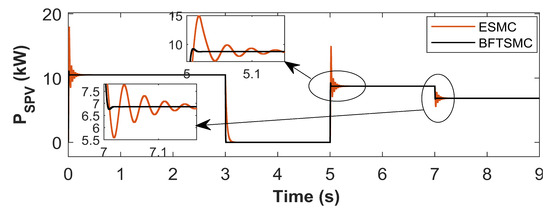
Figure 9.
Transient behavior of the solar PV output in Scenario I.
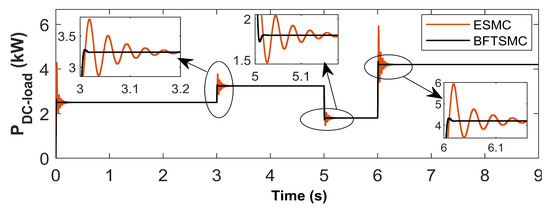
Figure 10.
Transient behavior of the DC load demand in Scenario I.
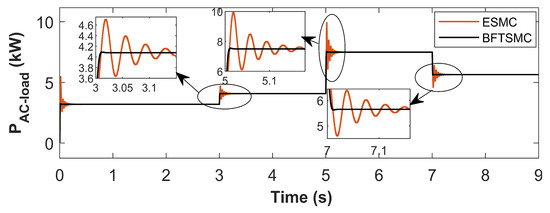
Figure 11.
Transient behavior of the AC load demand in Scenario I.
With the AC load fixed at 3.2 kW, a residual power of approximately 4.8 kW remains available within the system. This surplus is effectively managed through the BVSC, which orchestrates the seamless transfer of energy from the AC bus to the DC bus, where it is subsequently stored in the BESS, as illustrated in Figure 12. For analytical clarity, the power transfer process is modeled as ideal, with no losses accounted for during this exchange.
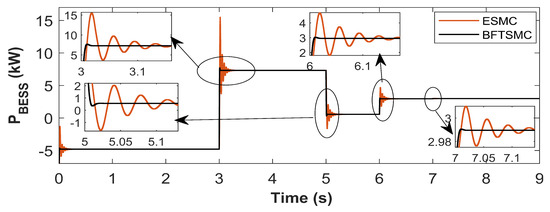
Figure 12.
Transient behavior of the BESS in Scenario I.
From the above analysis, it is obvious that, during steady-state operation, both the proposed control scheme and the ESMC exhibit comparable performance, maintaining system stability without inducing any noticeable transient disturbances. However, when subjected to dynamic operating conditions, such as sudden fluctuations in solar irradiance or load demand, the controllers’ responses diverge significantly. These dynamic behaviors and their implications on system performance are examined as follows.
- Sudden PV loss and simultaneous load surge (t = 3–5 s)
During the interval –5 s, the system undergoes a critical transient event triggered by an abrupt drop in solar irradiance from 1000 W/m2 to 0 W/m2, resulting in the complete loss of the PV generation from 10.57 kW to 0 kW, as illustrated in Figure 9. Concurrently, DC and AC load demands increase to 3.24 kW and 4.08 kW, respectively (see Figure 10 and Figure 11). With the PV array rendered inoperative, the BESS instantaneously assumes the entire load burden, delivering 3.24 kW to the DC bus and 4.08 kW to the AC bus to ensure energy balance within the system. And it is obvious that the BVSC enables the required DC-to-AC power transfer, as depicted in Figure 12. This compounded disturbance marked by zero generation and a load spike, which induces substantial voltage oscillations on the DC bus, as shown in Figure 13. However, the proposed controller exhibits superior resilience by maintaining DC-bus voltage regulation within tighter bounds, significantly outperforming the baseline control scheme.
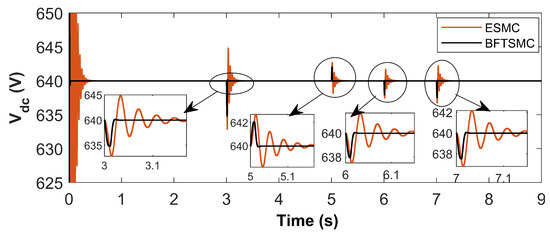
Figure 13.
Transient behavior of the DC-bus voltage in Scenario I.
- Irradiance ramp-up and mixed-load variations (t = 5–7 s)
At s, a sudden increase in solar irradiance from 0 W/m2 to 750 W/m2 results in PV generation ramping up to 8.74 kW. Simultaneously, the DC load demand drops to 1.8 kW for the interval –6 s, while the AC load increases to 7.5 kW and remains constant throughout –7 s. The excess PV energy after satisfying the DC load is transferred to the AC side via the BVSC. However, during this interval, an initial 0.56 kW power shortfall arises on the AC bus, which is compensated by the BESS. Similarly, at s, the DC load rises sharply to 7.5 kW, reducing the available PV power for the AC side to 4.54 kW. Consequently, a deficit of 2.96 kW is once again met by the BESS. These rapid load and generation dynamics lead to temporary voltage and power flow disturbances. Despite these fluctuations, the proposed control strategy demonstrates marked improvements in transient behavior, exhibiting lower voltage overshoots, quicker recovery times, and improved power-sharing dynamics compared to the ESMC.
- Gradual PV decline and balanced load redistribution (t = 7 s)
Again, at s, the irradiance decreases modestly from 750 W/m2 to 600 W/m2, leading to a corresponding reduction in PV output to 6.86 kW. Simultaneously, the DC load demand increases to 4.2 kW, leaving a surplus of 2.66 kW on the DC side. On the AC side, the load decreases from 7.5 kW to 5.65 kW. The available surplus is transferred through the BVSC, yet a residual power deficit of 2.99 kW persists, which is successfully supplied by the BESS, contingent on its state of charge. Figure 13 highlights the DC-bus voltage response under abrupt load and PV generation disturbances, demonstrating the effectiveness of the proposed BFTSMC over the ESMC. At s, a sharp PV irradiance fluctuation causes significant overshoot (OS ≈ 645 V) and oscillatory settling in the ESMC response, whereas BFTSMC rapidly restores voltage to the nominal 640 V with reduced undershoot (US ≈ 634 V) and a lower settling time (ST < 0.1 s). At s, the ESMC suffers visible oscillations with an OS of 643 V and prolonged settling, while the BFTSMC maintains a near nominal voltage with minimal oscillation and faster settling time. At s, a BESS charging/discharging event induces voltage dips and peaks in the ESMC (US ≈ 636 V, OS ≈ 642 V), whereas the BFTSMC damps these fluctuations and achieves quick steady-state restoration. Finally, at s, the ESMC exhibits repeated oscillations (OS ≈ 641 V, US ≈ 638 V), while the BFTSMC ensures better damping, minimal delay, and negligible deviation.
Under the aforementioned dynamic operating conditions, the proposed control framework consistently demonstrates superior performance compared to the benchmark methods. It achieves this by effectively minimizing transient deviations, enabling smoother power transitions, and maintaining DC-bus voltage stability with enhanced precision and robustness.
- Quantitative Performance Comparison: Scenario I
A comprehensive comparative evaluation of transient responses, as presented in Table 2, Table 3, Table 4 and Table 5, clearly underscores the superior dynamic performance of the proposed BFTSMC over the conventional ESMC under various operating scenarios. In the presence of fluctuating solar PV conditions, the BFTSMC achieves remarkably lower settling times, reducing from 225 ms and 232 ms (ESMC) to just 17 ms, reflecting a performance enhancement exceeding 92%. Similarly, voltage overshoots are significantly suppressed; for instance, the BFTSMC limits the overshoot to 0.7%, in contrast to 71.62% under the ESMC, representing a 99.02% improvement.

Table 2.
Transient performance of BFTSMC and ESMC under fluctuating the solar PV output power in Scenario I.

Table 3.
Transient performance of BFTSMC and ESMC under variable DC load demand conditions in Scenario I.

Table 4.
Transient performance of BFTSMC and ESMC under variable AC load demand conditions in Scenario I.

Table 5.
Transient performance of BFTSMC and ESMC during BESS charging/discharging in Scenario I.
For scenarios involving a variable DC load, BFTSMC consistently demonstrates faster system stabilization, maintaining settling times within 12–18 ms, compared to 190–205 ms for ESMC. Corresponding overshoot values are also substantially reduced, ranging from 0.5% to 2.2%, whereas ESMC registers overshoots between 16.50% and 30%, yielding improvement margins up to 98.33%. Under variable AC load conditions, BFTSMC again showcases its efficacy with rapid transient response—with settling times of 14–17 ms versus 185–195 ms for ESMC. Most notably, it eliminates overshoots (0%), whereas ESMC exhibits values as high as 33.33%, marking a 100% suppression.
During BESS charging and discharging events, the proposed controller maintains consistent superiority by fully eliminating overshoot (0%) where ESMC records up to 96%. Settling time reductions exceeding 90% are also observed, reinforcing the robustness of BFTSMC in handling power exchange dynamics. Furthermore, Table 6 highlights the effectiveness of BFTSMC in DC-bus voltage regulation. Settling times are markedly improved—reduced to 16–18 ms from the 178–210 ms range observed under ESMC—corresponding to an improvement of up to 92.38%. Overshoot is either completely suppressed or confined within 0–0.31%, as compared to values up to 0.78% under ESMC, translating to a maximum improvement of 100%. Undershoot is also mitigated more effectively, with BFTSMC achieving reductions from 0.35 to 1.10% (ESMC) down to 0–0.78%, including complete elimination at s.

Table 6.
The comparison of BFTSMC and ESMC in terms of settling time, overshoot, and undershoot of the DC-bus voltage in Scenario I.
On an aggregate basis across all tested transient scenarios, the BFTSMC achieves average reductions of 91.67% in settling time, 96.47% in overshoot, and 42.63% in undershoot relative to ESMC. Importantly, BFTSMC achieves the full suppression of both overshoot and undershoot in several key cases, validating its superior capability in enhancing system dynamic response, voltage stability, and power-sharing coordination under highly variable conditions.
6.2.2. Scenario II
This scenario evaluates the dynamic performance of the proposed controller under compound disturbances, including variable renewable energy input, fluctuating load demand, and a time-varying delay in the control signal. The delay, which emulates startup latency and network-induced jitter in cyber-physical systems, is modeled as . The objective is to assess the controller’s robustness, adaptability, and delay-tolerant behavior under realistic operating conditions. In this scenario, the proposed BFTSMC is benchmarked against the MPC strategy reported in [35].
- Steady-State Operation (t = 0–5 s)
During the initial steady-state period (–5 s), the solar PV array delivers a constant output of 8.74 kW under an irradiance level of 750 W/m2, as illustrated in Figure 14. Concurrently, the DC and AC load demands are 3.6 kW (Figure 15) and 1.1 kW (Figure 16), respectively, resulting in a total system load of 4.7 kW. The surplus power of approximately 4.04 kW is routed to the BESS, which operates in charging mode during this interval, as depicted in Figure 17. The BVSC mechanism within the proposed control framework dynamically allocates excess energy, ensuring real-time power balancing and operational stability. This phase highlights the controller’s capability to manage the energy dispatch under nominal conditions, with both BFTSMC and MPC schemes successfully maintaining voltage regulation and stable system operation. Notably, no transient deviations or oscillatory behavior are observed during this phase, reflecting the efficacy of both controllers under steady-state conditions.
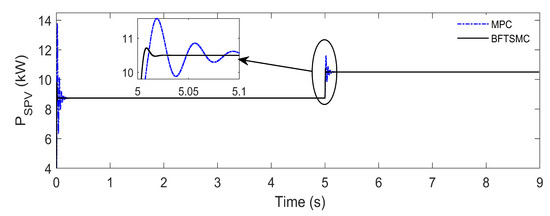
Figure 14.
Transient behavior of the solar PV output in Scenario II.
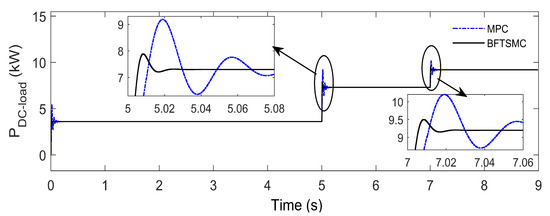
Figure 15.
Transient behavior of the DC load demand in Scenario II.
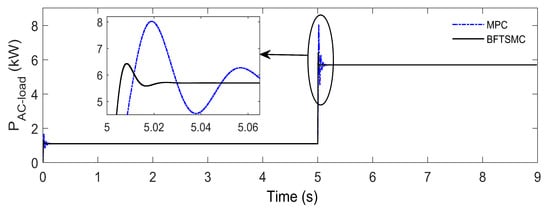
Figure 16.
Transient behavior of the AC load demand in Scenario II.
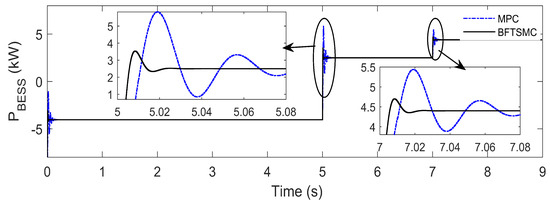
Figure 17.
Transient behavior of the BESS in Scenario II.
- Disturbance Scenario: Sudden Generation-Load Imbalance (t = 5–7 s)
At s, solar irradiance increases to 1 kW/m2, resulting in a sharp rise in PV output to 10.50 kW, as shown in Figure 14. Simultaneously, the system experiences a compounded disturbance in the form of abrupt load surges. Specifically, the DC load demand increases to 7.3 kW (Figure 15), sustained for a duration of 2 s, while the AC load concurrently rises to 5.7 kW (Figure 16). This results in a total instantaneous load of approximately 13 kW, surpassing the available PV generation and inducing a temporary power deficit of 2.5 kW. The proposed control framework responds swiftly to this imbalance by transitioning the BESS into discharge mode, as illustrated in Figure 17, thereby compensating for the shortfall without delay. Despite the elevated stress on the system due to concurrent generation-load mismatches, the BFTSMC maintains stable and precise regulation of the DC-bus voltage, dynamically coordinating the power exchange among PV, load, and storage subsystems. In contrast, the benchmark MPC exhibits larger voltage deviations and slower transient recovery when subjected to the same perturbation. This highlights the superior disturbance rejection capability and dynamic response of the proposed BFTSMC, which ensures seamless power balancing and enhanced system stability during critical load-generation mismatches.
- High-Stress Event: Extended Power Deficit (t = 7 s Onward)
At s, the system encounters a more severe disturbance marked by sustained generation–load imbalance. While the PV output remains constant at 10.50 kW (Figure 14), both load components exhibit further increases. The DC load surges to 9.2 kW (Figure 15), and the AC load remains elevated at 5.7 kW (Figure 16), leading to a total instantaneous power demand of 14.9 kW—substantially exceeding the available PV capacity. The resulting 4.4 kW deficit is promptly supplied by the BESS operating in discharge mode, as shown in Figure 17. The corresponding transient responses in Figure 18, particularly around s and s, underscore the superior performance of the proposed BFTSMC in regulating the DC-bus voltage during dynamic events. The BFTSMC effectively constrains overshoot and ensures rapid convergence to the reference voltage V. In contrast, the benchmark MPC controller exhibits a pronounced overshoot, significantly exceeding the reference level, and demonstrates slower recovery toward the steady state. Furthermore, the zoomed-in views in Figure 18 highlight BFTSMC’s faster settling time and lower oscillatory behavior following disturbances. These results validate the enhanced transient handling capability of the proposed controller, with consistent improvements observed in overshoot suppression, settling speed, and voltage tracking accuracy under high-stress operating conditions.
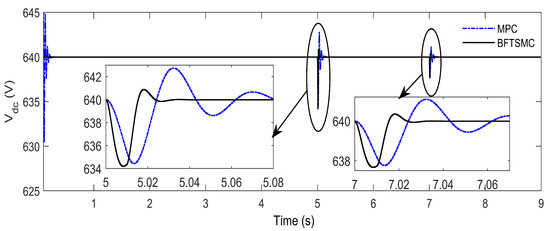
Figure 18.
Transient behavior of the DC-bus voltage in Scenario II.
- Quantitative Performance Comparison: Scenario II
The comparative analysis in Scenario II clearly demonstrates the superior dynamic performance of the proposed BFTSMC controller over the benchmark MPC [35] under multiple transient events induced by time-varying delays and fluctuating operating conditions. In terms of ST, the BFTSMC achieves consistently faster convergence across all disturbances, with improvements ranging from 71.64% to 83.7% relative to MPC. Notably, during the PV fluctuation at s (Table 7), the BFTSMC reduces the ST from 135 ms (MPC) to 22 ms—an 83.7% reduction.

Table 7.
Transient performance of BFTSMC and MPC under fluctuating Solar PV output power in Scenario II.
Regarding OS, the BFTSMC significantly suppresses voltage spikes during transient events. As presented in Table 8, OS reductions of 70.04% and 70% are achieved during DC load surges at s and s. Similarly, during AC load variations (Table 9), the OS reduction reaches 57.21%, and, in BESS transitions (Table 10), it exceeds 68%. The most substantial OS improvement, 80.06%, is recorded during the PV-induced disturbance at s. Moreover, in BESS dynamics (Table 10), ST improvements of 80% and 79.66% are observed at s and s, respectively.

Table 8.
Transient performance of BFTSMC and MPC under variable DC load demand conditions in Scenario II.

Table 9.
Transient performance of BFTSMC and MPC under variable AC load demand conditions in Scenario II.

Table 10.
Transient performance of BFTSMC and MPC during BESS charging/discharging in Scenario II.
Undershoot (US) performance, detailed in Table 11, further validates the BFTSMC’s robustness in maintaining voltage stability. The controller achieves 65.96% and 65.21% reductions in US at s and s, respectively, compared to MPC. On average, the BFTSMC delivers a 78.15% reduction in settling time and a 65.95% reduction in overshoot over MPC in this scenario. It is worth noting that the time-varying control signal delay introduced in Scenario II exacerbates the transient behavior compared to Scenario I, yet the proposed controller consistently outperforms MPC across all metrics.

Table 11.
Comparison of BFTSMC and MPC in terms of settling time, overshoot, and undershoot of the DC-bus voltage in Scenario II.
It can be concluded that the BFTSMC exhibits marked enhancements in all transient performance indices—settling time, overshoot, and undershoot—thereby validating its superior stability, faster dynamic regulation, and robust adaptability in the face of realistic cyber-physical disturbances. Building on these simulation-based insights, the next subsection presents a real-time validation of the proposed scheme via PIL simulation.
7. Real-Time Validation
To verify the real-time feasibility and practical deployment capability of the proposed control scheme, a PIL simulation is conducted, as illustrated in Figure 19. PIL-based validation is widely adopted in advanced control system research for evaluating algorithm performance under realistic hardware-execution constraints, without the need for full-scale hardware prototyping. A standalone Simulink subsystem is constructed to encapsulate only the proposed control logic, which is configured for automatic C code generation using embedded coder. Within the main simulation environment, the original controller is replaced with a PIL block by navigating to Simulink > Embedded Coder > PIL Block. The LAUNCHXL-F28379D microcontroller is selected as the target processor due to its suitability for high-speed digital control applications, and all associated configuration steps, such as clock settings, I/O mapping, and interface definitions are executed as per the standard Embedded Coder workflow.
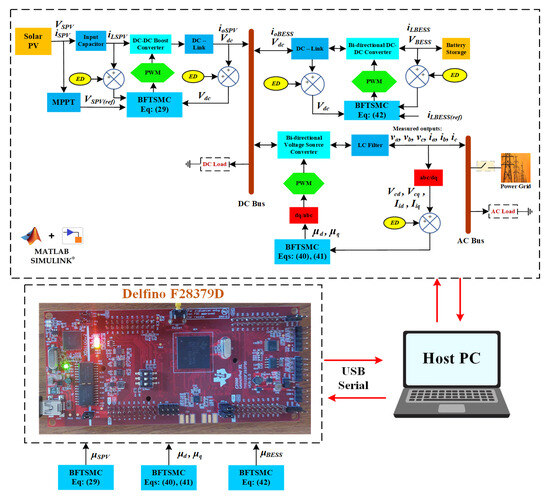
Figure 19.
Controller implementation in the PIL platform.
During PIL execution, the power-stage model—comprising the DC–DC and DC–AC converter dynamics runs on the host machine via MATLAB/Simulink, while the real-time execution of the control algorithm occurs on the LAUNCHXL-F28379D board. The microcontroller processes incoming analog signals (e.g., measured voltages and currents, as well as reference commands) and returns digital switching pulses to the host simulation through the PIL interface. A high-speed USB connection enables low-latency, bidirectional communication between the target hardware and the simulation environment, thus ensuring closed-loop operation and synchronous real-time interaction between the plant and controller domains. To ensure a consistent and unbiased comparison, all system parameters, converter settings, and controller gains are maintained identically between the PIL environment and the original Simulink-based simulation. The proposed HADCMG architecture is fully integrated within the PIL framework and evaluated against a baseline control strategy adopted from the literature [54]. The real-time performance assessment is conducted under a range of dynamic operating scenarios, including variations in load demand, solar irradiance, and battery charging/discharging events, to rigorously evaluate the controller’s responsiveness, stability, and robustness in hardware-executable conditions.
- Initial power distribution and energy flow (t = 0–2 s)
At the beginning of the simulation (t = 0–2 s), the solar PV system generates a steady output of 8.74 kW, as depicted in Figure 20. During this interval, the system experiences light loading conditions, with power demands of 1.28 kW on the DC side (Figure 21 and 3.3 kW on the AC side (Figure 22). After satisfying the DC load, the remaining 7.46 kW is directed to the AC bus. With the AC load consuming 3.3 kW, a surplus of 4.16 kW persists. This excess energy is transferred from the AC to the DC side via the BVSC and subsequently stored in the BESS, as depicted in Figure 23. Assuming negligible power conversion losses, the system maintains a steady-state power balance during this phase. Both the proposed and conventional control schemes exhibit equivalent performance, with no observable transient deviations. However, as subsequent dynamic events unfold, significant performance differences emerge, as elaborated in the following intervals.
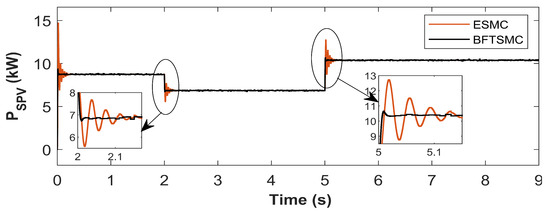
Figure 20.
Transient behavior of the solar PV output in the PIL platform.
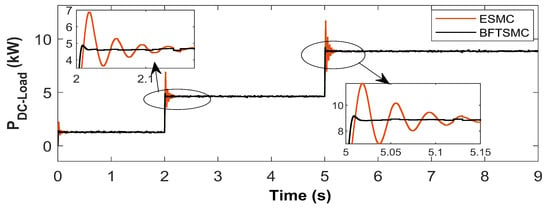
Figure 21.
Transient behavior of the DC load demand in the PIL platform.
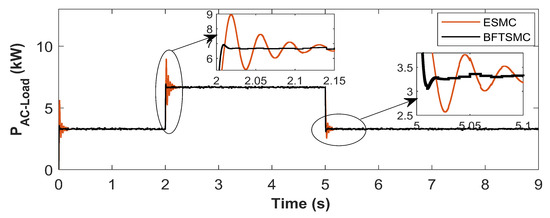
Figure 22.
Transient behavior of the AC load demand in the PIL platform.
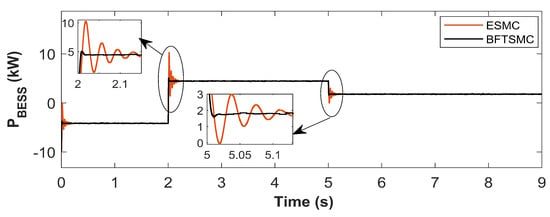
Figure 23.
Transient behavior of the BESS in the PIL platform.
- Dynamic response to sudden solar irradiance drop (t = 2–5 s).
At s, the system encounters a notable disturbance caused by an abrupt reduction in solar irradiance to 600 W/m2, decreasing PV generation to 6.86 kW. Concurrently, the DC load increases to 4.63 kW and the AC load to 6.68 kW, resulting in a total demand of 11.31 kW. After meeting the DC demand, the remaining 2.05 kW of PV power is supplied to the AC side via the BVSC. This results in a significant power deficit of 4.45 kW in the AC subsystem, which is promptly mitigated by the BESS. These abrupt variations introduce transient disturbances in both power flow and DC-bus voltage, depicted in Figure 24. This scenario serves as a critical benchmark for evaluating the dynamic response and stability of the control strategies under realistic, non-ideal conditions.
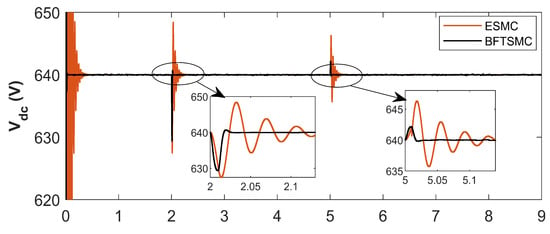
Figure 24.
Transient behavior of the DC-bus voltage in the PIL platform.
- Load redistribution and energy deficit management (t = 5–9 s)
During the interval –9 s, the PV system resumes full output, delivering 10.38 kW. The DC load increases significantly to 8.86 kW, while the AC load decreases to 3.3 kW. Following the allocation of 8.86 kW to satisfy the DC load, the residual 1.52 kW of PV power is redirected to the AC subsystem via the BVSC. However, with an AC demand of 3.3 kW, a power shortfall of 1.78 kW arises. This deficit is again compensated by the BESS, demonstrating the controller’s capacity for real-time power redistribution and seamless coordination between DC and AC buses. This operational window demonstrates the proposed controller’s ability to maintain power balance, ensure voltage stability, and dynamically manage energy flow across subsystems, particularly under conditions simultaneously involving high DC loads and moderate AC demand.
Overall, the proposed control strategy demonstrates robust real-time power management capabilities, effectively maintaining system stability, ensuring fast dynamic response, and achieving seamless coordination between generation, storage, and load under varying operating conditions.
8. Conclusions
This paper has proposed a robust and intelligent control framework for the coordinated operation of solar PV, BESS, and BVSC in HADCMGs. The control architecture integrates a BFTSMC with adaptive gain modulation and a modified reaching law to enhance the dynamic voltage stability and precise real-time power coordination among heterogeneous DERs. Additionally, the incorporation of a virtual capacitor emulates synthetic inertia, further strengthening transient response under sudden disturbances. To ensure optimal control performance under varying conditions, an MPA is employed for real-time parameter adaptation. Extensive simulation studies under diverse operating scenarios including rapid PV irradiance fluctuations, sudden DC/AC load transitions, and dynamic BESS charging/discharging events validate the efficacy of the proposed scheme. In Scenario I, the BFTSMC outperformed a benchmark ESMC, achieving a 91.67% reduction in settling time, a 96.47% decrease in overshoot, and a 42.63% improvement in DC-bus voltage undershoot. Furthermore, in the more challenging Scenario II, which incorporates time-varying communication delays, the proposed controller maintained superior performance over an existing MPC, delivering a 78.15% faster settling time and 65.95% lower overshoot. These results also highlight the sensitivity of transient performance to communication-induced delays, underscoring the importance of delay-resilient control design. In addition, to assess real-time feasibility, the proposed controller was deployed on a PIL platform using a Texas Instruments LAUNCHXL-F28379D microcontroller. The PIL results exhibited close alignment with simulation outcomes, confirming the controller’s real-time responsiveness, computational tractability, and suitability for embedded implementation. Overall, the proposed BFTSMC framework guarantees closed-loop stability, accurate power sharing, and enhanced transient regulation, positioning it as a strong candidate for practical deployment in resilient and intelligent next-generation microgrids.
Future Work
Future extensions of this work will target several advanced directions to further enhance the practical viability and scalability of the proposed control framework:
- Adaptive control under uncertainty and real-world variability: Future efforts will focus on integrating stochastic and data-driven adaptive mechanisms capable of learning from the real-world measurements of solar irradiance, load profiles, and environmental dynamics to maintain high control performance under uncertainty.
- Battery aging-aware control: Incorporating electrochemical degradation models and state-of-health (SoH) indicators into the control loop will enable lifetime-aware energy dispatch strategies, promoting long-term operational reliability and safety of energy storage systems.
- Cyber-resilient and delay-tolerant design: The current controller will be fortified with cyber-physical security mechanisms, including delay-tolerant consensus protocols, fault detection filters, and mitigation schemes against packet losses and malicious intrusions in networked control environments.
- Scalability to heterogeneous and large-scale DERs: To validate scalability, the controller will be tested on microgrid configurations integrating diverse DERs such as wind turbines, fuel cells, and hybrid energy systems, each exhibiting distinct nonlinearities and control constraints.
- Fault-tolerant control and islanded operation: Future work will investigate the controller’s capabilities for autonomous fault detection, isolation, and recovery, enabling robust operation during grid outages, internal component failures, and intentional islanding modes.
Author Contributions
M.S.I.: Conceptualization; methodology; software; validation; data curation; original draft preparation; visualization. T.K.R.: Conceptualization; methodology; investigation; resources; data curation; writing—original draft preparation; writing—review and editing; visualization; supervision; project administration; funding acquisition. I.J.B.: Conceptualization; validation; formal analysis; data curation; writing—original draft preparation; writing—review and editing. All authors have read and agreed to the published version of the manuscript.
Funding
This research received no external funding.
Data Availability Statement
Data are contained within the article.
Conflicts of Interest
The authors declare no conflicts of interest.
Abbreviations
The following abbreviations are used in this manuscript:
| BESS | Battery Energy Storage System |
| BFTSMC | Backstepping Fast Terminal Sliding Mode Control |
| BSC | Backstepping Control |
| BVSC | Bidirectional Voltage Source Converter |
| DISMC | Double Integral Sliding Mode Control |
| DPCS | Droop-Based Control Scheme |
| FLC | Fuzzy Logic Controller |
| GRES | Green Renewable Energy Source |
| HADCMG | Hybrid AC/DC Microgrid |
| ITSMC | Integral Terminal Sliding Mode Control |
| LQR | Linear Quadratic Regulator |
| MPA | Marine Predators Algorithm |
| NN | Neural Network |
| PI | Proportional-Integral |
| PIL | Processor-in-the-Loop |
| PPC | Pole Placement Controller |
| PV | Photovoltaic |
| SMC | Sliding Mode Controller |
| SoC | State of Charge |
| VIMS | Virtual Inertia Management Scheme |
Appendix A. Optimized Control Parameters
- BVSC unit:
, , , , , , , , , , , , , , , , ,
- Solar PV unit:
, , , , , , , , , , .
- Battery unit:
, , , , , , , , ,
References
- Islam, M.S.; Bushra, I.J.; Roy, T.K.; Oo, A.M.T. Enhanced Transient Stability in Hybrid DC/AC Microgrids: Robust Composite Control Strategy With Virtual Capacitors Integration Using ANFIS-Optimized Control Gain Parameters. IET Renew. Power Gener. 2025, 19, e70066. [Google Scholar] [CrossRef]
- Roy, T.K. Techno-economic and environmental assessment of green hydrogen production in multiple Australian regions using different electrolyzer technologies. Renew. Energy 2026, 256, 123879. [Google Scholar] [CrossRef]
- Dong, H.; Lu, P.; Jiang, X.; Chen, X.; Wang, P.; Zhu, J. Uncertainty Feasible Region Analysis for Microgrids in the Coordination with Distribution System Considering Interactive Power Deviation. Algorithms 2025, 18, 142. [Google Scholar] [CrossRef]
- Mo, D.; Li, Q.; Sun, Y.; Zhuo, Y.; Deng, F. Design of a New Energy Microgrid Optimization Scheduling Algorithm Based on Improved Grey Relational Theory. Algorithms 2025, 18, 36. [Google Scholar] [CrossRef]
- Mo, D.; Li, Q.; Sun, Y.; Zhuo, Y.; Deng, F. Multi-Objective Optimization Scheduling of a Wind–Solar Energy Storage Microgrid Based on an Improved OGGWO Algorithm. Algorithms 2025, 18. [Google Scholar] [CrossRef]
- Haque, T.; Roy, T.K.; Faria, F.; Khatun, M.M.; Sarkar, T.; Hore, A.K. DC-Bus Voltage Regulation in DC Microgrids Using a Power Reaching Law-Integral Sliding Mode Control Approach. In Proceedings of the International Conference on Computer, Communication, Chemical, Materials and Electronic Engineering, Rajshahi, Bangladesh, 26–27 December 2021; pp. 1–4. [Google Scholar]
- Roy, T.K.; Saha, S.; Oo, A.M.T. An Optimised Adaptive Integral Sliding Mode Control Approach for Multi-Area Power Systems: Enhancing LFC Robustness and Stability With RES Integration and Time-Delay Mitigation. IET Energy Syst. Integr. 2025, 7, e70006. [Google Scholar] [CrossRef]
- Saleem, M.I.; Saha, S.; Roy, T.K.; Ghosh, S.K. Assessment and management of frequency stability in low inertia renewable energy rich power grids. IET Gener. Transm. Distrib. 2024, 18, 1372–1390. [Google Scholar] [CrossRef]
- Roy, T.; Pramanik, M.; Ghosh, S. Design of an integral terminal-based sliding mode controller for PV and BESS-based DC microgrids. Energy Nexus 2022, 7, 100130. [Google Scholar] [CrossRef]
- Saleem, M.I.; Saha, S.; Roy, T.K. Inertia Sensitivity Analysis of Power Grids With High Penetration of Renewable Energy Sources. IEEE Trans. Ind. Appl. 2025, 61, 5362–5380. [Google Scholar] [CrossRef]
- Dahane, A.S.; Sharma, R.B. Hybrid AC-DC microgrid coordinated control strategies: A systematic review and future prospect. Renew. Energy Focus 2024, 49, 100553. [Google Scholar] [CrossRef]
- Khan, M.Y.A.; Liu, H.; Zhang, Y.; Wang, J. Hybrid AC/DC microgrid: Systematic evaluation of interlinking converters, control strategies, and protection schemes: A review. IEEE Access 2024, 12, 160097–160132. [Google Scholar] [CrossRef]
- Chen, S.; Zhang, S.; He, S.; Yang, H. Two-Timescale Online Optimization of Behind-the-Meter Battery Storage for Stacked Revenue by Providing Multi-Services. IEEE Trans. Smart Grid 2025, 16, 2222–2233. [Google Scholar] [CrossRef]
- Islam, M.S.; Bushra, I.J.; Roy, T.K.; Oo, A.M.T. Virtual Capacitor-Based Robust Composite Controller for Stability Enhancement in DC Microgrids With Wind, PV and Battery Integration. IET Gener. Transm. Distrib. 2025, 19, e70125. [Google Scholar] [CrossRef]
- Salleh, N.A.M.; Hannoon, N.M.; Baharom, R. Design and Analysis of an Optimized Proportional-Integral-Derivative (PID) Controller for Photovoltaic (PV) Based Microgrid in Power System. In Proceedings of the 2024 IEEE Industrial Electronics and Applications Conference (IEACon), Kuala Lumpur, Malaysia, 4–5 November 2024; pp. 157–165. [Google Scholar]
- Eyisi, C.; Li, Q. Blended Integral-Proportional/Proportional-Integral Control for Voltage Source Converter-Based AC Microgrids. IEEE Access 2024, 12, 122828–122839. [Google Scholar] [CrossRef]
- Perez-Estevez, D.; Doval-Gandoy, J.; Yepes, A.G.; López, O. Positive-and negative-sequence current controller with direct discrete-time pole placement for grid-tied converters with LCL filter. IEEE Trans. Power Electron. 2016, 32, 7207–7221. [Google Scholar] [CrossRef]
- Sedhom, B.E.; El-Saadawi, M.M.; Hatata, A.Y.; Abd-Raboh, E.H.E. H-Infinity versus model predictive control methods for seamless transition between islanded-and grid-connected modes of microgrids. IET Renew. Power Gener. 2020, 14, 856–870. [Google Scholar] [CrossRef]
- Patarroyo-Montenegro, J.F.; Andrade, F.; Guerrero, J.M.; Vasquez, J.C. A linear quadratic regulator with optimal reference tracking for three-phase inverter-based islanded microgrids. IEEE Trans. Power Electron. 2020, 36, 7112–7122. [Google Scholar] [CrossRef]
- Islam, M.S.; Bushra, I.J.; Ghosh, S.K. Design of data–driven linear quadratic regulator controller for DC–DC boost converter optimized by genetic algorithm. In Proceedings of the 3rd International Conference on Advancement in Electrical and Electronic Engineering, Gazipur, Bangladesh, 25–27 April 2024; pp. 1–6. [Google Scholar]
- Aghmadi, A.; Ali, O.; Sajjad Hossain Rafin, S.; Taha, R.A.; Ibrahim, A.M.; Mohammed, O.A. Hardware Implementation of Hybrid Data Driven-PI Control Scheme for Resilient Operation of Standalone DC Microgrid. Batteries 2024, 10, 297. [Google Scholar] [CrossRef]
- Kareem, R.M.; Al-Nussairi, M.K.; Bayindir, R. Optimal Performance of PI Controller for AC Microgrid based on Metaheuristic Optimization Algorithms. IEEE Access 2025, 13, 45733–45752. [Google Scholar] [CrossRef]
- Wang, J.; Jin, C.; Wang, P. A uniform control strategy for the interlinking converter in hierarchical controlled hybrid AC/DC microgrids. IEEE Trans. Ind. Electron. 2017, 65, 6188–6197. [Google Scholar] [CrossRef]
- Loh, P.C.; Li, D.; Chai, Y.K.; Blaabjerg, F. Autonomous operation of hybrid microgrid with AC and DC subgrids. IEEE Trans. Power Electron. 2012, 28, 2214–2223. [Google Scholar] [CrossRef]
- Gutiérrez-Escalona, J.; Roncero-Clemente, C.; Husev, O.; Matiushkin, O.; Blaabjerg, F. Artificial Intelligence in the Hierarchical Control of AC, DC and Hybrid AC/DC Microgrids—A Review. IEEE Access 2024, 12, 157227–157246. [Google Scholar] [CrossRef]
- Zheng, D.D.; Madani, S.S.; Karimi, A. Data-driven distributed online learning control for islanded microgrids. IEEE J. Emerg. Sel. Top. Circuits Syst. 2022, 12, 194–204. [Google Scholar] [CrossRef]
- Sahoo, S.; Amirthalakshmi, T.; Ramesh, S.; Ramkumar, G.; Arockia Dhanraj, J.; Ranjith, A.; Obaid, S.A.; Alfarraj, S.; Kumar, S. Artificial deep neural network in hybrid PV system for controlling the power management. Int. J. Photoenergy 2022, 2022, 9353470. [Google Scholar] [CrossRef]
- Balakishan, P.; Chidambaram, I.; Manikandan, M. Smart fuzzy control based hybrid PV-wind energy generation system. Mater. Today Proc. 2023, 80, 2929–2936. [Google Scholar] [CrossRef]
- Wazir, A.B.; Alghamdi, S.; Alobaidi, A.; Alhussainy, A.A.; Milyani, A.H. Efficient Frequency Management for Hybrid AC/DC Power Systems Based on an Optimized Fuzzy Cascaded PI-PD Controller. Energies 2024, 17, 6402. [Google Scholar] [CrossRef]
- Xu, D.; Zhang, Z.; Ye, Y.; Jiang, B.; Shi, P. Multiagent-Based Model Predictive Control of Parallel PV/BESS Electric Springs in Microgrids. IEEE Trans. Ind. Inform. 2025, 21, 3616–3626. [Google Scholar] [CrossRef]
- Roy, T.K.; Pervej, M.F.; Tumpa, F.K.; Paul, L.C. Nonlinear adaptive controller design for velocity control of a DC motor driven by a DC-DC buck converter using backstepping approach. In Proceedings of the 2nd International Conference on Electrical, Computer & Telecommunication Engineering, Rajshahi, Bangladesh, 8–10 December 2016; pp. 1–4. [Google Scholar]
- Rani, T.; Roy, T.K. Design of an Integral Sliding Mode Controller-Based on a Hybrid Reaching Law for DC Microgrids. In Proceedings of the 5th International Conference on Electrical Engineering and Information Communication Technology, Dhaka, Bangladesh, 18–20 November 2021; pp. 1–5. [Google Scholar]
- Biglarahmadi, M.; Ketabi, A.; Baghaee, H.R.; Guerrero, J.M. Integrated nonlinear hierarchical control and management of hybrid AC/DC microgrids. IEEE Syst. J. 2021, 16, 902–913. [Google Scholar] [CrossRef]
- Roy, C.; Roy, T.K.; Paul, L.C. Robust Backstepping Integral Terminal Sliding Mode Controller for a Grid-Tied Solar PV Unit. In Proceedings of the IEEE International Conference on Power, Electrical, Electronic and Industrial Applications, Dhaka, Bangladesh, 3–4 December 2021; pp. 37–40. [Google Scholar]
- Rute-Luengo, E.; Navas-Fonseca, A.; Gómez, J.S.; Espina, E.; Burgos-Mellado, C.; Saez, D.; Sumner, M.; Munoz-Carpintero, D. Distributed model-based predictive secondary control for hybrid AC/DC microgrids. IEEE J. Emerg. Sel. Top. Power Electron. 2022, 11, 627–642. [Google Scholar] [CrossRef]
- Roy, T.K.; Mahmud, M.A.; Oo, A.M.T.; Haque, M.E.; Muttaqi, K.M.; Mendis, N. Nonlinear adaptive backstepping controller design for islanded DC microgrids. IEEE Trans. Ind. Appl. 2018, 54, 2857–2873. [Google Scholar] [CrossRef]
- Akter, F.; Roy, T. Design of a Robust Integral Sliding Mode Controller Using the Continuous Function-Based Fast Power Reaching Law for DC-DC Boost Converters in Fuel Cells Applications. In Proceedings of the IEEE International Conference on Power, Electrical, Electronic and Industrial Applications, Dhaka, Bangladesh, 3–4 December 2021; pp. 45–48. [Google Scholar]
- Li, X.; Wang, M.; Jiang, W.; Dong, C.; Xu, Z.; Wu, X. An autonomous finite-time backstepping control for decentralized automatic power sharing of hybrid energy storage systems in DC microgrids. IEEE Trans. Smart Grid 2024, 15, 3348–3360. [Google Scholar] [CrossRef]
- Yu, D.; Zhang, W.; Chu, Z.; Zhang, H.; Wang, Z. An optimized synchronous approach to DC/DC droop backstepping control considering voltage compensation in DC microgrids. Electr. Power Syst. Res. 2024, 228, 110014. [Google Scholar] [CrossRef]
- Roy, T.K.; Morshed, M.; Tumpa, F.K.; Pervej, M.F. Robust adaptive backstepping speed controller design for a series DC motor. In Proceedings of the IEEE International WIE Conference on Electrical and Computer Engineering, Dhaka, Bangladesh, 19–20 December 2015; pp. 243–246. [Google Scholar]
- Roy, T.K.; Mahmud, M.A.; Hossain, M.J.; Oo, A.M.T. Nonlinear backstepping controller design for sharing active and reactive power in three-phase grid-connected photovoltaic systems. In Proceedings of the Australasian Universities Power Engineering Conference, Wollongong, NSW, Australia, 27–30 September 2015; pp. 1–6. [Google Scholar]
- Panda, S.K.; Subudhi, B. An extended state observer based adaptive backstepping controller for microgrid. IEEE Trans. Smart Grid 2023, 15, 171–178. [Google Scholar] [CrossRef]
- Roy, T.K.; Mahmud, M.A. A robust nonlinear backstepping control scheme for hybrid AC/DC microgrids to improve dynamic stability against external disturbances. Clean. Energy Syst. 2022, 3, 100044. [Google Scholar] [CrossRef]
- Islam, M.S.; Bushra, I.J.; Roy, T.K.; Ghosh, S.K. Transient stability enhancement of a PEM fuel cell based DC-DC boost converter via robust composite backstepping and integral terminal sliding mode control. In Proceedings of the 3rd International Conference on Advancement in Electrical and Electronic Engineering, Gazipur, Bangladesh, 25–27 April 2024; pp. 1–6. [Google Scholar]
- Pal, P.; Behera, R.K.; Sharma, R. Fast Integral Terminal Sliding Mode Control Based Current Sensorless Scheme of DAB Converter. IEEE Trans. Ind. Appl. 2025, 61, 6593–6604. [Google Scholar] [CrossRef]
- Islam, M.S.; Bushra, I.J.; Roy, T.K.; Ghosh, S.K. Design of global integral terminal sliding mode controller with exponential reaching law for solar PV and BESS-based DC microgrids. In Proceedings of the 3rd International Conference on Advancement in Electrical and Electronic Engineering, Gazipur, Bangladesh, 25–27 April 2024; pp. 1–6. [Google Scholar]
- Akter, F.; Roy, T.K.; Islam, M.S.; Alkhateeb, A.F.; Mollah, M.A. Design of a Nonlinear Integral Terminal Sliding Mode Controller for a PEM Fuel Cell Based on a DC-DC Boost Converter. IEEE Access 2022, 10, 97419–97428. [Google Scholar] [CrossRef]
- Roy, T.K.; Oo, A.M.T. Enhancing grid frequency regulation in low inertia modern multi-area power systems using cascaded non-integer control approaches with BESS-based virtual inertia. IET Renew. Power Gener. 2024, 18, 4602–4620. [Google Scholar] [CrossRef]
- Alam, F.; Ashfaq, M.; Zaidi, S.S.; Memon, A.Y. Robust droop control design for a hybrid AC/DC microgrid. In Proceedings of the 2016 UKACC 11th international conference on control (CONTROL), Belfast, UK, 31 August–2 September 2016; pp. 1–6. [Google Scholar]
- Bharatee, A.; Ray, P.K.; Puhan, P.S. Implementation of Improved Mixed Droop Technique With Sliding-Mode Control for Active Power Distribution in a Grid-Interactive Microgrid. IEEE Trans. Ind. Inform. 2024, 20, 10750–10760. [Google Scholar] [CrossRef]
- Jiang, H.; Zhao, Y.; Su, H.; Wang, Y. Design of fuzzy sliding mode controller for islanded AC/DC hybrid microgrid with cyber-attacks. IET Control Theory Appl. 2024, 18, 2142–2154. [Google Scholar] [CrossRef]
- Armghan, H.; Yang, M.; Armghan, A.; Ali, N. Double integral action based sliding mode controller design for the back-to-back converters in grid-connected hybrid wind-PV system. Int. J. Electr. Power Energy Syst. 2021, 127, 106655. [Google Scholar] [CrossRef]
- Bushra, I.J.; Islam, M.S.; Roy, T.K.; Mollah, M.R.U.; Ghosh, S.K. Designing a Double Integral Sliding Mode Controller for Battery Storage and Wind-Based DC Microgrids With ANN-MPPT. In Proceedings of the 2024 IEEE International Conference on Power, Electrical, Electronics and Industrial Applications (PEEIACON), Rajshahi, Bangladesh, 12–13 September 2024; pp. 1–6. [Google Scholar]
- TEBAA, M.; OUASSAID, M. Experimental Validation of A Robust Integral Terminal Sliding Mode Control for Three-Phase Voltage Source Converter in Standalone Microgrid. Clean. Eng. Technol. 2025, 26, 100968. [Google Scholar] [CrossRef]
- Balasubramanian, K.; Murugesan, N.; Samuel, A.M.R.; Sampath, M. Lyapunov-based energy optimization for hybrid renewable energy system for coastal area. Proc. Inst. Mech. Eng. Part A J. Power Energy 2025, 1–13. [Google Scholar] [CrossRef]
- Haque, T.; Roy, T.K.; Faria, F.; Khatun, M.M.; Sarkar, T.; Hore, A.K. Power Flow Control in DC Microgrids Using an Integral Sliding Mode Control Approach. In Proceedings of the International Conference on Automation, Control and Mechatronics for Industry 4.0 (ACMI), Rajshahi, Bangladesh, 8–9 July 2021; pp. 1–5. [Google Scholar]
- Rani, T.; Roy, T.K. Design of a Robust Integral Sliding Mode Controller Considering Continuous Function-Based Fast Power Reaching Law for DC Microgrids. In Proceedings of the 24th International Conference on Computer and Information Technology, Dhaka, Bangladesh, 18–20 December 2021; pp. 1–5. [Google Scholar]
- Islam, M.S.; Roy, T.K.; Bushra, I.J.; Ghosh, S.K.; Oo, A.M.T. A novel composite control approach to enhance stability in wind/PV/PEM fuel cell/hydrogen/BESS—based DC microgrids. J. Eng. 2025, 2025, e70062. [Google Scholar] [CrossRef]
- Islam, M.S.; Bushra, I.J.; Roy, T.K.; Ghosh, S.K.; Oo, A.M.T. Enhanced composite controller for PV/PMSG/PEMFC and BESS-based DC microgrids voltage regulation: Integrating integral terminal sliding mode controller and recursive backstepping controller. IET Gener. Transm. Distrib. 2024, 18, 3608–3632. [Google Scholar] [CrossRef]
- Islam, M.S.; Bushra, I.J.; Ghosh, S.K. Dynamic Stability Improvement of Grid Tied Solar PV System Via Backstepping Global Integral Terminal Sliding Mode Control. In Proceedings of the 7th International Conference on Development in Renewable Energy Technology, Dhaka, Bangladesh, 7–9 March 2024; pp. 1–6. [Google Scholar]
- Alam, Z.; Roy, T.K.; Ghosh, S.K.; Mahmud, M.A. Control of DC–DC Buck Converters Using Robust Composite Backstepping and Integral Terminal Sliding Mode Approaches. IEEE J. Emerg. Sel. Top. Ind. Electron. 2023, 4, 866–877. [Google Scholar] [CrossRef]
- Delavari, H.; Naderian, S. Backstepping fractional sliding mode voltage control of an islanded microgrid. IET Gener. Transm. Distrib. 2019, 13, 2464–2473. [Google Scholar] [CrossRef]
- Prasad, E.N.; Sahani, M.; Dash, P. A new adaptive integral back stepping fractional order sliding mode control approach for PV and wind with battery system based DC microgrid. Sustain. Energy Technol. Assess. 2022, 52, 102261. [Google Scholar] [CrossRef]
- Roy, T.K.; Ghosh, S.K.; Saha, S. Stability enhancement of battery energy storage and renewable energy-based hybrid AC/DC microgrids using terminal sliding mode backstepping control approaches. ISA Trans. 2023, 142, 40–56. [Google Scholar] [CrossRef] [PubMed]
- Roy, T.K.; Ghosh, S.K.; Saha, S. Robust backstepping global integral terminal sliding mode controller to enhance dynamic stability of hybrid AC/DC microgrids. Prot. Control Mod. Power Syst. 2023, 8, 8. [Google Scholar] [CrossRef]
- Zhang, Y.; Li, Y.W. Energy management strategy for supercapacitor in droop-controlled DC microgrid using virtual impedance. IEEE Trans. Power Electron. 2016, 32, 2704–2716. [Google Scholar] [CrossRef]
- Swaminathan, G.V.; Periasamy, S.; Lu, D.D.C. Capacitor current control based virtual inertia control of autonomous DC microgrid. IEEE Trans. Ind. Electron. 2022, 70, 6908–6918. [Google Scholar] [CrossRef]
- Ni, F.; Yan, L.; Liu, J.; Shi, M.; Zhou, J.; Chen, X. Fuzzy logic-based virtual capacitor adaptive control for multiple HESSs in a DC microgrid system. Int. J. Electr. Power Energy Syst. 2019, 107, 78–88. [Google Scholar] [CrossRef]
- Nandi, R.; Tripathy, M.; Gupta, C.P. Advanced Adaptive Virtual Impedance Based Dual Mode Inverter Controller for Power and Voltage Coordination in LV AC Microgrid. IEEE Trans. Ind. Appl. 2024, 60, 8495–8508. [Google Scholar] [CrossRef]
- Vankadara, S.K.; Chatterjee, S.; Balachandran, P.K.; Mihet-Popa, L. Marine predator algorithm (MPA)-based MPPT technique for solar PV systems under partial shading conditions. Energies 2022, 15, 6172. [Google Scholar] [CrossRef]
Disclaimer/Publisher’s Note: The statements, opinions and data contained in all publications are solely those of the individual author(s) and contributor(s) and not of MDPI and/or the editor(s). MDPI and/or the editor(s) disclaim responsibility for any injury to people or property resulting from any ideas, methods, instructions or products referred to in the content. |
© 2025 by the authors. Licensee MDPI, Basel, Switzerland. This article is an open access article distributed under the terms and conditions of the Creative Commons Attribution (CC BY) license (https://creativecommons.org/licenses/by/4.0/).